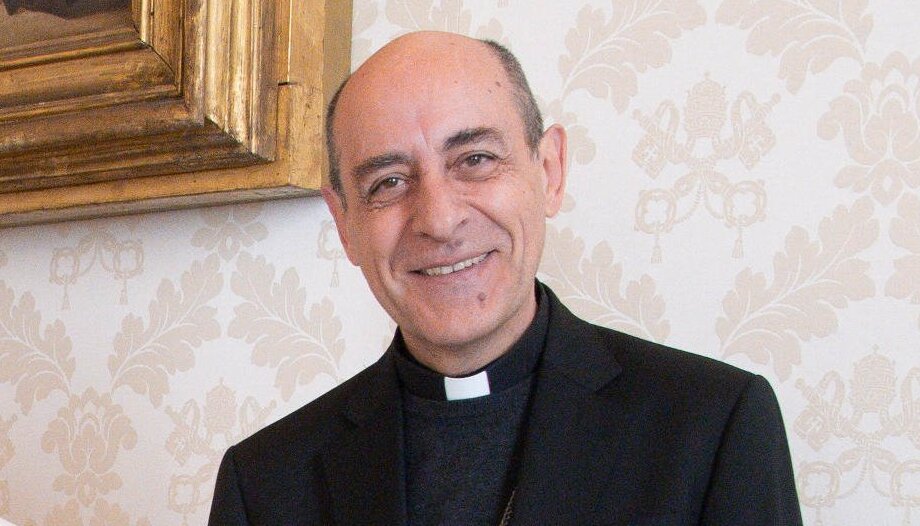Just two weeks after the publication of Fiducia suplicans, Victor Manuel Fernandez, Prefect of the Dicastery for the Doctrine of the Faith, has issued a press release in which he intends to clarify various problems that have arisen in the reception of the document.
On December 18, 2023, the Dicastery for the Doctrine of the Faith issued the Declaration Fiducia suplicanswhich opened the door to "the possibility of blessing couples in irregular situations and same-sex couples" under certain conditions.
The declaration stressed that it is a pastoral and not a doctrinal document, and recalled the doctrine on marriage as "an exclusive, stable and indissoluble union between a man and a woman, naturally open to the begetting of children" and on sexuality, reiterating that this is an unaltered teaching. However, both the somewhat convoluted wording of the document and the novelty it introduced in allowing non-ritual blessings for irregular or same-sex couples have opened the door to widely differing interpretations, leading to a situation of confusion in many places.
Opposing reactions
In this regard, in fact, the reactions have been very diverse. Bishops such as Georg BatzingThe President of the German Bishops' Conference, expressed their satisfaction with this document and welcomed "the pastoral perspective it brings". It is worth remembering the particular context of the Church in Germany, where various groups have demanded and implemented public blessings of homosexual couples.
Oscar Ojea, who pointed out that "living in an irregular situation or in a homosexual union does not obscure many aspects of the lives of people who seek to be enlightened with a blessing, and when they receive it, it becomes the greatest possible good for these brothers and sisters, since it leads to conversion".
On the other hand, many bishops, especially in African and even Asian dioceses, have taken a stand against these blessings. The bishops of Cameroon, the Democratic Republic of Congo or Ivory Coast have refused to allow such blessings in their dioceses, as have Archbishop Tomash Peta and Auxiliary Bishop Athanasius Schneider of the Archdiocese of St. Mary in Astana, Kazakhstan.
Other prelates, such as the Spanish Jose Ignacio Munilla, have stressed that, although the document is not contrary to doctrine, it creates a state of confusion that must be addressed pastorally. And Ukrainian Archbishop Sviestoslav Shevchuk, of the Byzantine rite, explained that the document cannot be applied in his church, precisely because of the disciplinary difference.
A clarifying statement
These diverse, and even opposing, reactions to the document have been Fiducia suplicans This was the reason why the Prefect of the Dicastery of the Faith wanted to "clarify" some points of this statement that, in his opinion, have not been well understood by the faithful. He did so through a press release issued by the Dicastery.
The Prefect shows understanding for the difficulties of some bishops or Episcopal Conferences, and points out that "what these Episcopal Conferences have expressed cannot be interpreted as doctrinal opposition, because the document is clear and classic on marriage and sexuality", and reiterates that it seeks to bless the couple (persons) and not the union (state). All this, through "blessings without liturgical form that do not approve or justify the situation in which these people find themselves" made in a spontaneous way, brief and far from any element that confuses them with a liturgical blessing.
The prefect recalls that many of these opposing reactions come from countries that "to varying degrees condemn, prohibit and criminalize homosexuality. In these cases, beyond the question of blessings, there is a broad, long-term pastoral task that includes formation, defense of human dignity, teaching of the Social Doctrine of the Church and various strategies that do not admit of haste".
The novelty of Fiducia suplicans
Cardinal Fernandez explains in the communiqué the real novelty of the document: the invitation to distinguish between two different forms of blessings: "liturgical or ritualized" and "spontaneous or pastoral".
The prefect maintains that in this sense, Fiducia suplicans offers "a specific and innovative contribution to the pastoral meaning of blessings, which makes it possible to broaden and enrich the classical understanding of blessings closely linked to a liturgical perspective", i.e. it is about "increasing pastoral blessings, which do not require the same conditions as blessings in a liturgical or ritual context" and asks the bishops "to make an effort of serene reflection, with the heart of pastors, outside of any ideology".
The note even includes an example of what such blessings might look like in which God's help is asked for in a spontaneous and non-ritual way:
Bishop Victor Manuel Fernandez appeals to the pastoral prudence and knowledge of his own faithful on the part of each bishop who can, on the other hand, "enable this type of simple blessings, with all the recommendations of prudence and care, but in no way are they authorized to propose or enable blessings that may resemble a liturgical rite".
Neither approval nor acquittal
"Gestures of pastoral closeness": this is the nature of this type of blessing, clarifies the prefect of the doctrine of the faith. Nor are they absolution, because these gestures are far from being a sacrament or a rite. they are simple expressions of pastoral closeness that do not have the same requirements as a sacrament or a formal rite.
A "novel" figure for which the cardinal calls for a previous catechesis that helps to understand them and "to free us from the fear that our blessings may express something inadequate".












